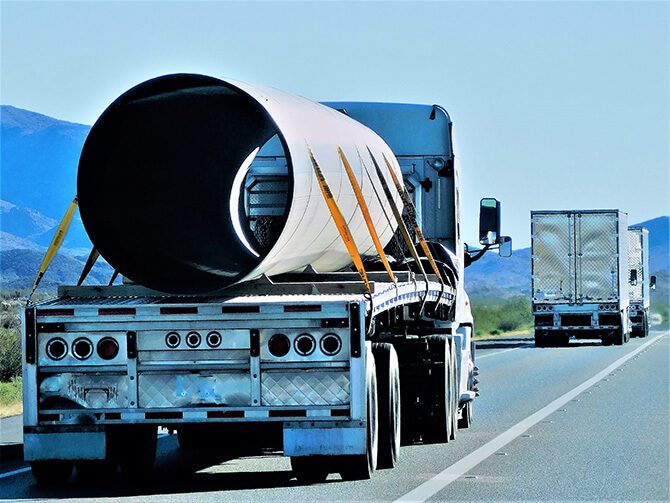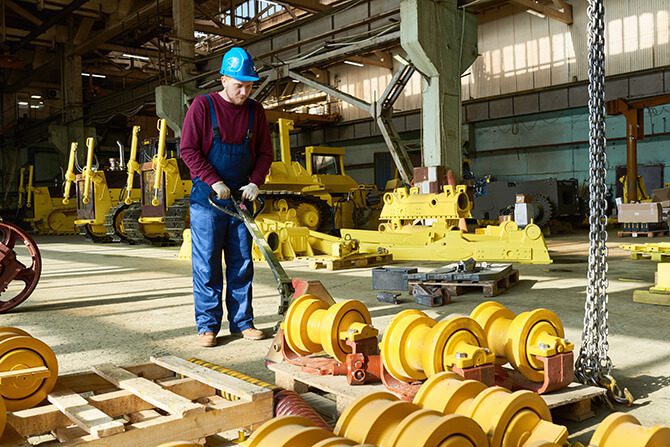
Transporting heavy machinery represents a challenge for every company in the world. Without the proper information and security measures, this type of heavy-duty can lead to work accidents and problems that can end up costing thousands of dollars. This article will provide you with a few helpful tips on how to transport heavy machinery safely.
What is heavy equipment transport?
Unlike LTL and FTL shipping, heavy machinery transport requires the use of special trailers designed specifically for this type of cargo. For heavy equipment transportation, you want to make sure you hire an experienced service provider who has years of experience in the heavy-duty sector. There are, however, a few things you can do on your side to make sure that your heavy equipment arrives on time and in good condition. For instance, finding the right heavy haul specialist is a great starting point. For this type of transportation, you also want to double-check that they have the right insurance for shipping heavy equipment. Let’s dig a little bit deeper into the subject.
Industries shipping heavy equipment
This type of specialized road transportation is critical in a variety of industries. In the construction industry, for example, machinery with weights and dimensions that exceed the standard is typically transported. The agricultural sector also necessitates the transportation of heavy machinery. Tractor transport is the most commonly requested agricultural service. Finally, there is a high demand for heavy machinery transport in the industrial sector.
These are the most common loads that require this type of special transport:
- Forklifts: telescopic, forklift, pallet truck
- Cranes: mobile, tower, telescopic
- Construction machinery: dumpers, bulldozers, generator sets
- Industrial machinery: trailers, milling machines, commercial vehicles
- Tractors and agricultural machinery: tractor implements, combines, irrigation equipment

Tractors are the most commonly requested vehicle to transport in the agricultural industry.
Tips for heavy equipment shipment
Plan
When transporting heavy equipment, a detailed plan is required. You will have to include all of the necessary information and requirements to ensure that everything is done correctly and safely. The following are some of the plan’s specific points:
- To transport an oversized load, you must first determine what permits you will need. Additional permits may be required depending on the states or countries through which your merchandise will pass through.
- In some cases, an escort vehicle may be required. Make sure you have that service if you are shipping heavy equipment by land.
- Road restrictions for heavy cargo and trucks must be followed along the way.
- Ideally, track your heavy equipment with the use of real-time TMS.
- Determine the location of the equipment’s loading and unloading.
- Check the extended forecast and avoid moving heavy equipment if there is heavy rain, snow, or other adverse weather conditions.
Hire a Qualified hauler
Make sure that the transporter you will hire is qualified for the job. Look at the company experience dealing with heavy machinery. To find the best carrier, we recommend you to ask yourself the following questions:
- Is my carrier prepared to transport heavy equipment? Does he have adequate trucks and trailers, ramps, safety equipment, etc. on his logistics arsenal?
- Is he aware of the loading guidelines for transporting heavy equipment?
- Who will be in charge of processing the permits? Will it be your responsibility?
- Do your shipping service include an escort vehicle, or will you have to do find one?
- Are the drivers trained to operate the machinery that will be moved? An extra look at your driver’s profile and their shipping reputation won’t hurt.
- Double-check that your haul supplier has a heavy equipment freight insurance

Make sure you hire an experienced partner before signing any contract.
Prepare for loading beforehand
Once you have planned your heavy equipment transport and found your ideal carrier, it’s time to get ready for action. Preparing the equipment for transportation can help to ensure that nothing is damaged or lost during the relocation. Follow these steps to prepare the loading of your heavy equipment:
- Remove any excess aggregate; debris, dirt, or any other substance that may fall or reduce friction during the transportation. These falling pieces can cause damage to cars on the road and possibly shift cargo during transport.
- If the equipment that needs to be transported has tires made of rubber, it is necessary to check the tire pressure beforehand. Low pressure can cause the tie-downs to loosen.
- Determine if friction devices are necessary for scenarios where there will be friction between the transport vehicle (such as metal crawler tracks on a metal deck) and the equipment. Poor road conditions and potholes can cause friction between the vehicle and the merchandise.
- Make sure the loading area is clear of obstacles, has solid ground, and is easily accessible by the trailer.
- Remove any personal items or attachments that do not belong to the equipment.

It is critical to prepare the area before loading heavy equipment.
Loading and unloading heavy equipment
When loading heavy equipment, the most important factor is safety. Do not operate or load the equipment until you are 100% sure you understand how to do it safely.
- Support the equipment next to some type of vehicle structure to prevent it from moving forward.
- Attaching load securing devices can cause damage to cylinders, brakes, or hydraulic hoses, so be careful when attaching them.
- Follow the manufacturer’s recommendations to the letter.
- Never use attachment points of uncertain strength or suitability.
- Attach heavy machinery and equipment with chains whenever possible.
- Use chains that are rated for the weight and are locked in the proper manner.
- When possible, use direct lashing.
Communication is critical
If you have hired a transporter for the equipment, make sure you keep in touch with them during the journey so you know if any problems or complications arise. You can then pass this information on to the receiving location so that they are ready for your arrival.
Another piece of advice is to keep the company’s contact information close to you. If something goes wrong, you’ll need to contact them right away, especially for insurance purposes.
Another factor to take into account is that the transport company has all the necessary information about the machinery and the requirements for its handling. This is a good way to ensure the safety and proper movement of heavy machinery and avoid complications.

Try to always stay in touch with your carrier provider during transportation.
Heavy equipment Freight Insurance
Because oversized loads are often more expensive than standard cargo and are an essential part of any business, insurance is a must for anyone shipping heavy cargo.
To pick up your machinery, any reputable heavy hauler that specializes in equipment hauling overweight loads, construction equipment, or heavy freight in potentially hazardous weather conditions must have a legally mandated level of insurance. It can be difficult to find this information online, but shippers should be happy to provide it if you ask. Insurance is usually included in the contract.

Make sure your carrier has heavy equipment freight insurance.
Heavy equipment Transport – Final notes
Dealing with heavy equipment shipping is not always easy. You will have to make an extra effort before hiring any shipping services company. Choosing the right provider can help you save a lot of time and money when dealing with oversize load permits. The shipping process for heavy equipment will require extra care, from the preparation to the execution. Make sure to have a well-prepared plan for every unexpected circumstance that may occur. The most critical moment is when loading and unloading the merchandise. Safety is a must. Make sure you take all necessary precautions before those critical moments. Last but not least, when dealing with heavy equipment transport, always keep your provider’s contact information as well as insurance contracts close at hand.


